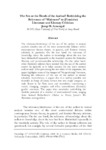Mostrar o rexistro simple do ítem
The Sex or the Death of the Author? Rethinking the Relevance of “Maleness” to (Feminist) Literature and Literary Criticism
| dc.contributor.author | Armengol, Josep M. | |
| dc.date.accessioned | 2016-07-15T08:35:21Z | |
| dc.date.available | 2016-07-15T08:35:21Z | |
| dc.date.issued | 2008 | |
| dc.identifier.citation | AEDEAN 2008, 31: 125-132 ISBN-978-84-9749-278-2 | |
| dc.identifier.isbn | 978-84-9749-278-2 | |
| dc.identifier.uri | http://hdl.handle.net/2183/17026 | |
| dc.description.abstract | [Abstract] The relevance/irrelevance of the sex of the author to textual analysis remains one of the most controversial debates within contemporary literary theory, in general, and feminist literary criticism, in particular. On the one hand, the relevance of knowledge about the author to knowledge about the text has been diminished repeatedly in the twentieth century by formalist, Marxist, and poststructuralist scholarship. On the other hand, other (feminist) scholars have insisted that the sex of the author cannot be ignored, as it helps account for the text’s content and/or style. After presenting the two sides of the argument, the paper highlights some of the dangers of “de-gendering” literature, showing the relevance of the sex of the author to textual criticism. Nevertheless, it argues that it is neither possible nor desirable to lump all (male) writers into one single category, as male fiction is far from static and monolithic, constituting a varied, changing, complex and often contradictory (fictional) gender construct. The paper thus concludes underlining the feminist potential of a number of male-authored texts, ranging from Samuel Richardson’s Clarissa to Henry James’s The Bostonians, among others. | |
| dc.language.iso | eng | |
| dc.publisher | Universidade da Coruña | |
| dc.title | The Sex or the Death of the Author? Rethinking the Relevance of “Maleness” to (Feminist) Literature and Literary Criticism | |
| dc.type | info:eu-repo/semantics/conferenceObject | |
| dc.rights.access | info:eu-repo/semantics/openAccess |






